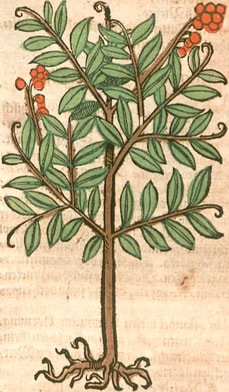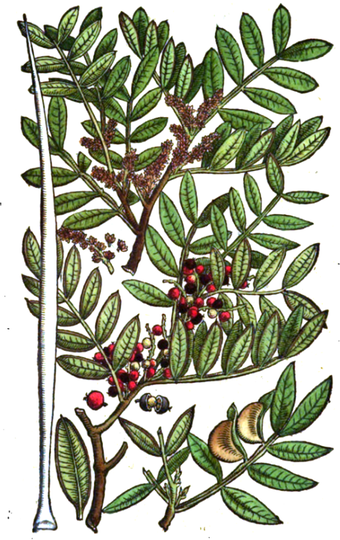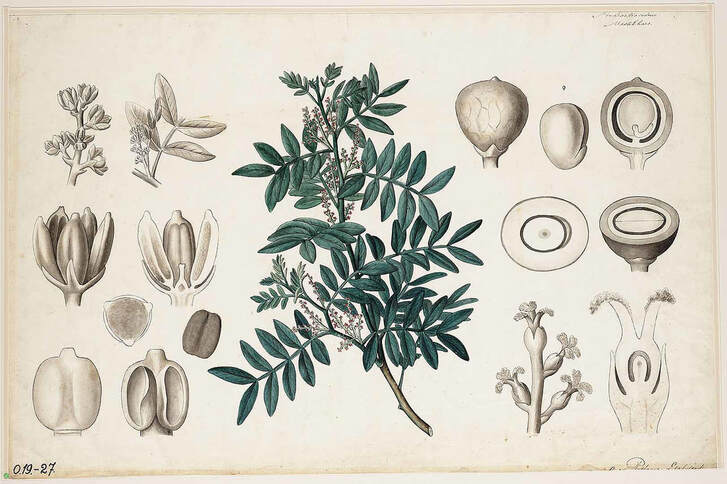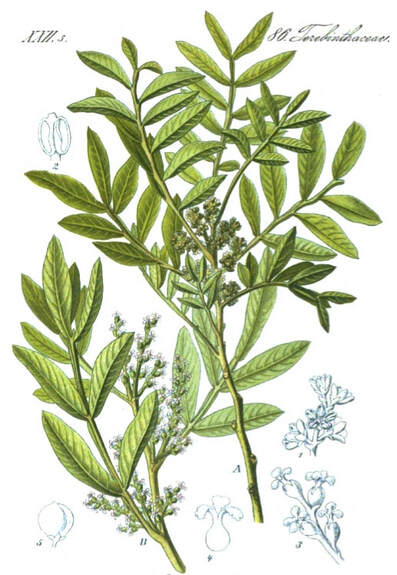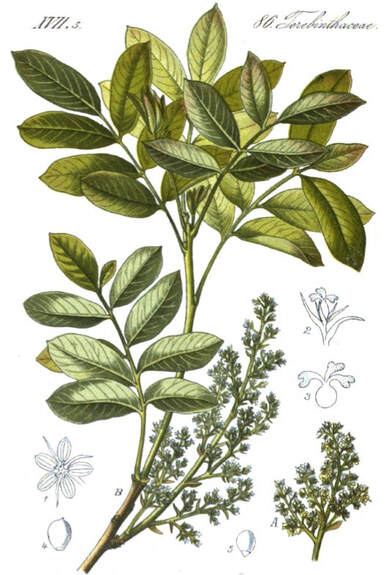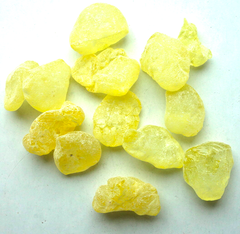Sentry Page Protection
Krauterbuch, Lonitzer, 1578
Kreutterbuch, Matthiolus, 1586
Botanische wandplaten (1904–1914)
Left: P. lentiscus Right: P. terebinthus
Flora von Deutschland (21), Kohler, 1885
Flora von Deutschland (21), Kohler, 1885
|
Botanical name:
Pistachio lentiscus (syn. Lentiscus mastiches) Related species which have supplied Mastic or have been used as a substitute include P. terebinthus, P. cabulica ('Roman Mastic', 'East Indian', or 'Bombay Mastic'), Parts used: Gum Temperature & Taste: Warm, dry. Sweet, Pungent |
Mastic Gum (Adam, 2017)
|
Uses:
1. Strengthens the Stomach and Spleen, Clears Damp, Tonifies Qi:
-benefits the Stomach and digestion: poor appetite, nausea and vomiting
-'excellent for the Stomach ... brings good concoction and digestion'. (Pemell, 1652)
-"Mastic strengthens the Stomach and Liver, restores Appetite" (Avicenna)
-'Fluxes of the Belly' (Diarrhea) from weakness
-Stomach and Duodenal Ulcers
-Stomach pain (swallow some grains before bed)
-cures bad breath
-Damp diseases including Diarrhea and Leukorrhea, especially associated with Spleen deficiency
-by strengthening the Spleen and clearing Damp, it was also used for Melancholy
-Pliny said it promotes Urine
2. Harmonises and Corrects Harsh Medicines:
-an important medicine to correct harsh and violent medicines, especially purgatives
-it can help balance and moderate a formula (similar to Licorice), and supports the Stomach with strong or bitter medicines.
-'it stays the acrimony, or sharpness of strong purging medicines, and is a good corrector of them'. (Pemell, 1652)
3. Settles Wind, Benefits the Heart and Brain:
-some grains of it swallowed after a meal strengthens the Head and Nerves; chewed to draw Phlegm from the Brain
-Dizziness, Vertigo, Epilepsy, Mental weakness
-chronic Headache, Migraine
-Heart weakness
-Palpitations, Arrhythmia from Heart weakness
-"Chewing of mastic ahsorbs and clears phlegm from head" (Avicenna)
4. Strengthens the Lungs, Clears Phlegm, Stops Cough:
-Sore Throat (held in the mouth)
-deficient Coughs, Lung weakness, cures spitting of Blood
-Wheezing, Asthma
-"beneficial in cough and haemoptysis" (Avicenna)
-"It dissolves the phlegm due to its rarefying, laxative and warming properties" (Avicenna)
5. Strengthens the Uterus, Regulates Menstruation:
-Excessive Menstruation
-Menstrual irregularity from deficiency, or Spleen Deficiency not controlling the Blood
-Threatened Miscarriage
-Leukorrhea, including that with Blood (coming from deficiency)
-Infertility
6. Resolves Swellings:
-swellings of the Stomach, Liver and other abdominal organs (Unani)
-classed as attenuant and resolvent in Unani medicine
-"Mastic strengthens the Kidneys and Intestines and proves useful in cases of swellings in these organs" (Avicenna)
7. Resists Poison:
-strengthens the Spleen during Epidemics
-Gonorrhea, Elephantiasis
8. Externally:
-chewed to draw Phlegm from the Brain and dry and comfort the brain
-externally as a Dentrifice or mouth wash for sore or foul gums, loose teeth; strengthens the Teeth and Gums
-"Mastic is incorporated in Tooth powders and liniments for beautifying the Skin and Teeth" (Avicenna)
-Sores and Ulcers of the Mouth and Tongue, a piece is held in the mouth and sucked
-the Teeth rubbed with the powder whitens them
-applied the powder on velvet to the temples to relieve Toothache (Pemell)
-in Plasters or Cataplasms for the Stomach
-tincture is applied to stop bleeding of Leech bites
-Powder was applied to dry and help fill hollow Wounds and Ulcers with flesh
-"Mastic extract and decoction of its leaves prevent Creeping Ulcers" (Avicenna)
-strengthens the joints and relieves their pain, applied topically
-applied to help heal broken bones; "it helps in setting the broken bones" (Avicenna)
-dissolved in Milk and applied to the eyes to brighten them and relieve dimness of sight
-chewed to sweeten the Breath
Dose:
500mg–2 grams
In diseases of the Stomach, it was common to swallow a few grains of Mastic
Comment:
The older it is, the yellower it gets.
Correctives:
1. Violet
2. Rose
3. Gum Arabic
4. Tragacanth
5. Vinegar
6. Caraway, Aniseed (against belching, Pemell)
Substitutes:
1. Mint (in its resolving action), otherwise Cinnamon (Unani)
2. Frankincense (Unani)
3. Pistachio, Walnut
Adulterants:
Since the time of Dioscorides, it has been widely open to adulteration, usually with Frankincense and Pine resin etc.
500mg–2 grams
In diseases of the Stomach, it was common to swallow a few grains of Mastic
Comment:
The older it is, the yellower it gets.
Correctives:
1. Violet
2. Rose
3. Gum Arabic
4. Tragacanth
5. Vinegar
6. Caraway, Aniseed (against belching, Pemell)
Substitutes:
1. Mint (in its resolving action), otherwise Cinnamon (Unani)
2. Frankincense (Unani)
3. Pistachio, Walnut
Adulterants:
Since the time of Dioscorides, it has been widely open to adulteration, usually with Frankincense and Pine resin etc.
Main Combinations:
Head, Brain, Nerves:
1. Headache from Bile and Phlegm Mastic with Aloe, Yellow Myrobalan, Rose, Saffron (Mesue)
2. Epilepsy, Mastic with Chebulic Myrobalan, Belleric Myrobalan, Stoechas, Polypody (Unani)
3. Strengthen the Eyes, Mastic with Eyebright (Nicholas)
Heart:
4. Strengthen the Heart:
-Mastic with Rose, Aloeswood, Sandalwood, Cinnamon (as in Aromatic Rose Compound Lesser of Mesue)
5. Palpitations, Mastic with Indian Spikenard, Aloeswood, Cinnamon, Clove, Lesser Cardamon, Citron peel (Aloeswood Powder for Palpitations)
Kidneys:
6. Kidney tonic and Aphrodisiac, Mastic with Salep (Orchis). (Unani)
7. Warm and strengthen the Kidneys, Mastic with Nutmeg, Tormentil, Cinnamon, Clove (as in Powder of Nutmeg Compound)
Lungs:
8. Sore Throat, Mastic with Frankincense, Raisin, Storax
9. Cough:
i. Mastic with Syrup of Coltsfoot (Pemell)
ii. and Asthma from Phlegm, Mastic with Aloe, Agaric, Hyssop (Issac)
iii. from thin Phlegm, Mastic with Frankincense, Conserve of Rose and Diacodium (Pemell)
10 Asthma, Mastic with Gentian, Hyssop, Agaric (Andrezeos)
Stomach and Digestion:
11. Strengthen the Stomach:
i. Mastic with Rose, Aloe (as in Stomach Pills of Mesue)
ii. Mastic with Cinnamon, Pomegranate, Galangal
iii. Mastic with Citron peel, Cinnamon, Sugar of Roses (Nicholas)
12. Loss of Appetite, Mastic with Cumin and Cardamon (Nicholas)
Gynecology & Obstetrics:
13. Leukorrhea:
i. Mastic with Cubeb, Tabasheer and Cardamon
ii. Orris (half oz.), Burnt Deer horn, Cuttlefish bone, White Coral, Rock Crystal, Olibanum, Mastic (1 dram each). Powder. Dose: hald dram to 2 scruples. (Dispensatorium medico pharmaceuticum Palatinatus, 1764)
14. Excessive Menstruation:
i. Mastic with Red Earth, Amber, Coriander, Date (Wirtzung)
ii. Mastic with Frankincense, Myrrh, Red Earth (Gabelhover)
15. Threatened Miscarriage, Mastic with Aloeswood, Sandalwood, Red Coral, Tabasheer, Bistort, Purslane, Coriander, Red Earth (Unani)
Other:
16. Chronic Fever, Mastic with Camomile, Aniseed, Lacca, Rose, Madder (Catilina)
17. To clear Damp and purge Phlegm, Mastic with Turbith and Ginger (Avicenna)
18. To purge Melancholy, Mastic with Dill seed, Aniseed, Licorice, Violet, Sorrel, Endive, Polypody, Cinnamon, Scammony (as in Powder of Polypody of Montagnana)
19. Elephantiasis, Mastic with Yellow Myrobalan, Fennel seed, Psyllium (Isaac)
Externally:
20. A salve to preserve from Dead Palsy and Arthritic diseases, Mastic with Hyssop, Nettle, Bay leaf, Rosemary, Sage, Costus, Spikenard, Wormwood, and St. Johns wort.
21. Powder to be applied to hollow wounds (ie. to fill with flesh), Mastic with Frankincense, Myrrh, Dragons Blood topically
22. 'Against pain of the temples proceeding from vapors ascending up to the Brain': Mastic, Olibanum (½ oz. each), Armenian (Red) Earth (2 drams), form a plaster with egg white and a little vinegar. (Pemell)
23. Masticatory Troches: Mastic, White Wax, Ginger (equal parts). (Pharmacopoeia extemporanea, Augustin, 1822)
24. To fasten loose teeth, steep Mastic in Rose water and use as a wash. (Pemell)
25. To strengthen the Gums and cleanse corruption of them, Mastic is heated in wine and used as a wash. (Pemell)
26. Tooth Caries: Mastic with Sandarac, Kino, Opium, Oil of Rosemary, form a mass with a little Spirit; to be applied to fill caries. (Niemann)
27. Toothache: dissolve Mastic with a sufficient amount of Spirit of Turpentine.
28. Chaps in the hands or lips, make an ointment with Mastic and Suet (Deer) and Oil of Roses.
Major Formulas:
Tincture of Mastic
Decoction of Tormentil (Gabelhover)
Pills of Mastic (Mesue)
Stomach Pills (Mesue)
Pills of Rhubarb (Greater) (Pil. de Raved Sceni) (Mesue)
Hiera Picra
Aromatic Rose Compound Lesser (Mesue)
Powder of Turbith (Avicenna)
Powder for Loss of Appetite (Nicholas)
Powder for the Lungs
Powder for Pica
Powder to Strengthen the Stomach (Nicolas)
Powder to Strengthen the Stomach and Digestion
Powder to Clarify the Eyes (Nicholas)
Powder of Nutmeg Compound
Powder of Polypody (Montagnana)
Pills for many Diseases of the Body
Pills for Migraine (2) (Galen)
1. Compound Tincture of Mastic:
i. Mastic, Olibanum, Myrrh (2 ½ oz. each), Alcohol (60 oz.). Digest, filter. Principally for chaps and chilblains. (Formulaire Magistral et Memorial Pharmaceutique, 1823)
2. Compound Spirit of Mastic:
i. Mastic, Myrrh, Olibanum (1 part each), Alcohol (24 parts). Macerate 24 hours, distil 2 parts. (Pharmacopoeia Oldenburgica, 1801)
ii.. Mastic, Myrrh, Olibanum, Amber (2 oz. each), Alcohol 90% (3 lbs.). Digest 4 days, distil 1 ½ pounds. (Pharmacopoeia Amstelodamensis, 1792)
Cautions:
Generally Safe.
1. Pemell said it can cause belching, in which case Caraway or Aniseed can be taken. He also advises not to give too much in one dose.
Main Preparations used:
Distilled Oil, Oil of Mastic, Spirit of Mastic, Mastic Water, Pills of Mastic
1. Tincture of Mastic:
i. Mastic (1 part), Alcohol 88% (8 parts). Digest 8 days, strain. (Dispensatorium Fuldense, 1791)
2. Spirit of Mastic:
i. Mastic (4 oz.), Nutmeg (1 oz.), Alcohol (1 lb.). Digest 3 days and add Water (4 lbs.). Distil three pounds. Dose: to 1 oz. (Dispensatorium Pharmaceuticum, 1777)
3. Elixir of Mastic:
i. Spirit of Mastic (2 lbs.), Spring Water (1 lb.), White Sugar (10 ounces). Mix. (Dispensatorium Pharmaceuticum, 1777)
4. Syrup of Mastic:
i. Mastic in coarse powder (2 oz.), Spirit of Mastic (12 oz.); infuse 3 days in a close vessel; strain and add: White Sugar (16 oz.). Make a Syrup. (Dispensatorium Pharmaceuticum, 1777)
5. Oil of Mastic:
i. Mastic (1 part), Olive oil (4 parts). Dissolve in a Water-bath. (Pharmacopoeia Sardoa, 1773)
ii. 'The oil of Mastic made by infusion and ebullition, or boiling, is mollifying, comforting and binding, very useful in diseases of the Mother [Uterus], against all pains in the belly and stomach, the hardness of Tumors, and pains of the joints and sinews; it also comforts the Brain, and strengthens the Liver and Heart'.
Generally Safe.
1. Pemell said it can cause belching, in which case Caraway or Aniseed can be taken. He also advises not to give too much in one dose.
Main Preparations used:
Distilled Oil, Oil of Mastic, Spirit of Mastic, Mastic Water, Pills of Mastic
1. Tincture of Mastic:
i. Mastic (1 part), Alcohol 88% (8 parts). Digest 8 days, strain. (Dispensatorium Fuldense, 1791)
2. Spirit of Mastic:
i. Mastic (4 oz.), Nutmeg (1 oz.), Alcohol (1 lb.). Digest 3 days and add Water (4 lbs.). Distil three pounds. Dose: to 1 oz. (Dispensatorium Pharmaceuticum, 1777)
3. Elixir of Mastic:
i. Spirit of Mastic (2 lbs.), Spring Water (1 lb.), White Sugar (10 ounces). Mix. (Dispensatorium Pharmaceuticum, 1777)
4. Syrup of Mastic:
i. Mastic in coarse powder (2 oz.), Spirit of Mastic (12 oz.); infuse 3 days in a close vessel; strain and add: White Sugar (16 oz.). Make a Syrup. (Dispensatorium Pharmaceuticum, 1777)
5. Oil of Mastic:
i. Mastic (1 part), Olive oil (4 parts). Dissolve in a Water-bath. (Pharmacopoeia Sardoa, 1773)
ii. 'The oil of Mastic made by infusion and ebullition, or boiling, is mollifying, comforting and binding, very useful in diseases of the Mother [Uterus], against all pains in the belly and stomach, the hardness of Tumors, and pains of the joints and sinews; it also comforts the Brain, and strengthens the Liver and Heart'.
Click the Tabs above for more information on this Medicine
Pliny on Mastic:
|
'The seed, bark, and tear-like juices of the lentisk are diuretics, and act astringently upon the bowels; a decoction of them, used as a fomentation, is curative of serpiginous sores, and is applied topically for humid ulcerations and erysipelas; it is employed also as a collutory for the gums. The teeth are rubbed with the leaves in cases of tooth-ache, and they are rinsed with a decoction of the leaves when loose: this decoction has the effect also of staining the hair. The gum of this tree is useful for diseases of the rectum, and all cases in which desiccatives and calorifics are needed; a decoction too of the gum is good for the stomach, acting as a carminative and diuretic; it is applied also to the head, in cases of head ache, with polenta. The more tender of the leaves are used as an application for inflammations of the eyes.
|
'The mastich produced by the lentisk is used as a bandoline for the hairs of the eye-lids, in compositions for giving a plumpness to the face, and in cosmetics for smoothing the skin. It is employed for spitting of blood and for inveterate coughs, as well as all those purposes for which gum acacia is in request. It is used also for the cure of excoriations; which are fomented either with the oil extracted from the seed, mixed with wax, or else with a decoction of the leaves in oil. Fomentations too are made of a decoction of it in water for diseases of the male organs. I know for a fact, that in the illness of Considia, the daughter of M. Servilius, a personage of consular rank, her malady, which had long resisted nil the more severe methods of treatment, was at last successfully treated with the milk of goats that had been fed upon the leaves of the lentisk'. (The Natural History of Pliny, trans. by Bostock and Riley, Vol. 5, 1856)
|
Pharmacographia, Fluckiger & Hanbury, 1879:
|
'Mastich has been known from a very remote period, and is mentioned by Theophrastus, who lived in the 4th century before the Christian era. Both Dioscorides and Pliny notice it as a production of the island of Chio, the modern Scio.
Avicenna described (about the year 1000) two sorts of mastich, the white or Roman (i.e. Mediterranean or Christian), and the dark or Nabathaean,— the latter probably one of the Eastern forms of the drug ... [probably Terebinth; Pistachia, terebinthus]. Benjamin of Tudela, who visited the island of Scio when travelling to the East about A.D. 1160-1173, also refers to it yielding mastich, which in fact has always been one of its most important productions, and from the earliest times intimately connected with its history. Mastich was prescribed in the 13th century by the Welsh "Meddy-gon Myddvai " as an ingredient of ointments. In the middle ages the mastich of Scio was held as a monopoly by the Greek emperors, one of whom, Michael Paleologus in 1261, permitted the Genoese to settle in the island. His successor Andronicus II. conceded in 1304 the administration of the island to Benedetto Zaccaria, a rich patrician of Genoa and the proprietor of the alum works of Fokia (the ancient Phocaea), north-west of Smyrna, for ten years, renouncing all tribute during that period. The concession was very lucrative, a large revenue being derived from the Contrata del Mastico or Mastich district:and the Zaccaria family, taking advantage of the weakness of the emperor, determined to hold it as long as possible. In fact they made themselves the real sovereigns of Scio and of some of the adjacent islands, and retained their position until expelled by Andronicus III. in 1329. The island was retaken by the Genoese under Simone Vignosi in 1346 ; and then by a remarkable series of events became the property of an association called the Maona (the Arabic word for subsidy or reinforcement). Many of the noblest families of Genoa enrolled themselves in this corporation and settled in the island of Scio; and in order to express the community of interest that governed their proceedings, some of them relinquished their family names and assumed the general name of Giustiniani. This extraordinary society played a part exactly comparable to that of the late East India Company. In Genoa it had its "Officium Chii"; it had its own constitution and mint, and it engaged in wars with the emperors of Constantinople, the Venetians and the Turks, who in turn attacked and ravaged the mastich island and adjacent possessions. The Giustinianis regulated very strictly the culture of the lentisk and the gathering and export of its |
produce, and cruelly punished all offenders. The annual export of the drug was 300 to 400 quintals, which were immediately assigned to the four regions with which the Maona chiefly traded. These were Romania (i.e. Greece, Constantinople and the Crimea), Occidente (Italy, France, Spain and Germany), Vera Turchia (Asia Minor), and Oriente (Syria, Egypt, and Northern Africa). In 1364, a quintal was sold for 40 lire; in 1417, the price was fixed at 25 lire. In the 16th century, the whole income from the drug was 30,000 ducats (£13,750), a large sum for that period.
In 1566, the Giustinianis definitively lost their beautiful island, the Turks under Piali Pasha taking it by force of arms under pretext that the customary tribute was not duly paid. A few years before that event, it was visited by the French naturalist Belon who testifies from personal observation to the great care with which the lentisk was cultivated by the inhabitants. When Tournefort was at Scio in 1701, all the lentisk trees on the island were held to be the property of the Grand Signor, and if any laud was sold, the sale did not include the lentisks that might be growing on it. At that time the mastich villages, about twenty in number, were required to pay 286 chests of mastich annually to the Turkish officers appointed to receive the revenue. In the beginning of the present century, when Olivier paid a visit to the island of Chios, he found 50,000 ocche (one occa=2. 82 Ib. avdp. = 1. 28 kilogrammes) or somewhat more to be the annual harvest of mastich. The month of January, 1850, was memorable throughout Greece and the Archipelago for a frost of unparalleled severity which proved very destructive to the mastich trees of Scio, and occasioned a scarcity of the drug that lasted for many years. The foregoing statements show that for centuries past Scio or Chios was famed for this resin; there are however a few evidences proving that at least a little mastich used also to be collected in other islands. Amari quoted an Arabic geographer of the 12th century speaking of "il mastice di Pantettaria cavato da lentischi e lo storace odorifefo." Pantellaria, Kossura of the ancients, is the small volcanic island south west of Sicily, not far from Tunis. In a list enumerating the drugs to be met with in 1582 in the fair of Frankfurt we find even mastich of Cyprus quoted as superior to the common. Cyprian mastich again occurs in the pharmaceutical tariffs of 1612 and 1669 of the same city, and in many others of that time. The disuse into which mastich has fallen makes it difficult to understand its ancient importance; but a glance at the pharmacopoeias of the l5th, 16th, and 17th centuries shows that it was an ingredient of a large number of compound medicines'. |


